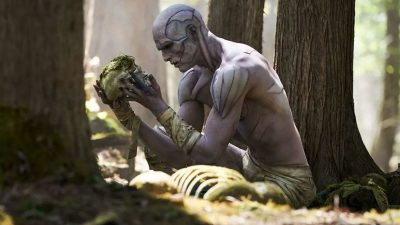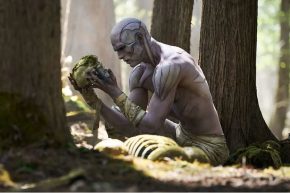Jane Austen Wrecked My Life, the debut feature by Laura Piani, a Franco-British romantic comedy that tries (sometimes too hard) to channel Austen’s wit and romantic entanglements into a modern setting. The result? A film that is charming in places, maddening in others, and occasionally interrupted by a llama spitting directly in our heroine’s face. (Yes, really. And no, it’s not a metaphor. Or maybe it is. Who knows at this point.)
Paris, Bookstores, and Self-Sabotage
Our heroine is Agathe (Camille Rutherford), an anxious but passionate bookstore clerk at Shakespeare & Co. in Paris, who dreams of being a novelist but can’t bring herself to show her work to anyone. Her best friend Felix (Pablo Pauly), goofy, supportive, and clearly infatuated with her, submits a sample to a literary residency in England on her behalf – posing as her agent. She gets in. Cue a kiss on the dock before she departs, and cue our collective groan: we all know this triangle is about to get complicated.

Agathe’s home life contrasts neatly with her artistic block. She lives with her sister Mona (Alice Butaud), a free-spirited one-night-stand enthusiast whose six-year-old son is used to mysterious men drifting through the apartment. In one of the film’s early running gags, Mona can’t remember if her latest conquest is called Gabriel or Raphael. This sets the tone: sexual liberation and mild-irresponsibility on one side, paralyzing romantic idealism on the other.
Agathe, of course, wants no part of dating apps, casual hook-ups, or the horror of liking someone’s Instagram post as a stand-in for courtship – I am sure many of us can sympathize with that notion. She proclaims she was “born in the wrong century” – a line that will either make you smile in recognition or roll your eyes so hard you’ll see the Regency era yourself.

Here Comes Oliver (and a Llama)
Once in England, the Jane Austen residency-cosplay intensifies. Agatha is picked up by Oliver (Charlie Anson), a brooding professor whose very first encounter with her involves our heroine vomiting on his shoes – triggered by trauma from a car accident that killed her parents. Their relationship begins with mutual disdain: he thinks Austen is overrated, she practically worships her. Naturally, they start to fall for each other. Naturally, Felix goes radio-silent back in Paris. Naturally, we settle into a triangle so obvious you can predict the beats before the first llama enters the frame.
Yes, the film has a llama. I mean, two. And slapstick. And a slow-motion ballroom dance sequence so clichéd it could be used in a parody trailer. There are a handful of slapstick moments where the film slightly resembles a Bridget Jones knockoff – except without Renée Zellweger’s impeccable comedic timing. Rutherford has a presence as Agathe, especially in her quieter, more dramatic scenes, but she’s no natural clown. Watching her stumble into Oliver’s bathroom naked or tumble through pastoral landscapes is less “adorably clumsy” and more “please, cut this scene in the edit.”

Missed Opportunities and Flat Characters
And the editing is otherwise sharp. Pierre Mazoyer’s cinematography gives Paris and the English countryside equal glow (shot also in France), Floriane Allier keeps the pacing tight, and Flore Vauville’s costumes flirt with Austen without going full bonnet-core. Which makes the flatness of the script all the more frustrating.
The problem isn’t just predictability (though it is very predictable). It’s that the supporting cast feels like afterthoughts. The other writers at the residency could have added texture, rivals, friends, comic foils, but instead remain cardboard cutouts. Oliver’s family is introduced and then dropped. Even Agathe’s bond with her late father, a potentially rich emotional thread, is reduced to a single quote about literature being “the only remedy for the disorder of thoughts and feelings,” followed by a rather cringe-inducing inspirational shoulder tap.

Still, there are flashes of the movie this could have been. An early scene in an antique shop where Agathe and Oliver open up with playful boldness, about his failed marriage, her two-year romantic drought, his father’s mental decline, her artistic paralysis – has genuine spark. It’s sharp, honest, and refreshingly free of contrivance. It shows what happens when characters are allowed to be messy and vulnerable rather than archetypes in a rom-com machine.
Pauly’s Felix is another bright spot. His intimacy issues and self-sabotage mirror Agatha’s creative paralysis, making their friendship far more interesting than either of her would-be romances. Their banter feels lived-in, their comfort palpable. When they finally kiss, you feel the weight of a decade of suppressed feelings. Too bad the film never dares to truly explore what that could mean.

Who Is This For?
Thematically, Piani circles questions that could resonate with anyone stuck in self-doubt: How do you find your voice when the voices of the greats – say, Jane Austen – feel like they’re judging you from beyond the grave? Is literature supposed to soothe the soul, or incite revolution? Is romance dead in the age of swiping right, or do we just need to “spit on each other” more llama-style until something sticks?
But these questions never fully cohere. Instead, the film drifts between slapstick, earnest melodrama, and Austen-flavored wish-fulfillment without ever mastering any of them. It’s a shame, because Piani clearly has an eye for tone and a love for her material. For a first feature, this is still an achievement. It just needed another draft (or two).
Should you watch Jane Austen Wrecked My Life? If you’re an old soul allergic to dating apps or an Austen devotee willing to forgive clichés then yes. For everyone else: maybe save it for a quiet Sunday when you’re in the mood for an almost-romance, almost-comedy, almost-drama.
Because here’s the irony: Jane Austen didn’t wreck anyone’s life. But if you’re not careful, her
Jane Austen Wrecked My Life is now playing the movies, and streaming on Amazon and Apple TV.
~ by Dora Endre ~

























Comments